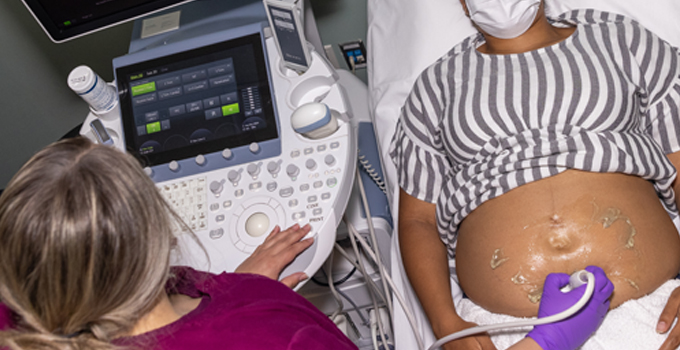Lupus is a chronic autoimmune condition. Your doctor may also call this condition systemic lupus erythematosus (SLE). With lupus, the immune system targets the joints and organs.
Your doctor can help you manage lupus symptoms before and during pregnancy. With proper prenatal care, most babies born to mothers with lupus are healthy. For the best chance at a healthy pregnancy, work with your doctor to control your symptoms and blood pressure for at least six months before becoming pregnant.
Tell your doctor right away if you have lupus and are pregnant or want to be. Lupus can cause problems with your health or pregnancy without good care. At UNM, we take care of you and the pregnancy, from your first visit through delivery.
Lupus Complications During Pregnancy
Women with uncontrolled lupus are at an increased risk of preeclampsia. That is very high blood pressure during pregnancy. Around 2 in 10 pregnant women with lupus get preeclampsia.
You can have high blood pressure without any symptoms. Go to all scheduled prenatal appointments. Call your doctor if you experience any of the following:
- Blurred vision
- Nasua, vomiting or dizziness
- Severe headache
- Unexplained swelling in the hands or feet
The dangers of high blood pressure in pregnancy
About 1 in 25 pregnancies in the U.S. are affected by preeclampsia, which can happen without warning.
Related Reading
More complications from unmanaged lupus could include:
- Blood clots
- Diabetes
- Kidney damage or failure
- Low birthweight
- Pregnancy loss
- Preterm birth (before 37 weeks of pregnancy)
Managing Lupus Episodes While Pregnant
Lifestyle factors such as high stress or a lack of rest could contribute an episode, or flare. Being pregnant doesn’t directly cause a flare.
Flare-ups can come and go at any time during a pregnancy. They occur most often during the first and second trimester.
Call your doctor if you have symptoms of a lupus flareup, including:
- Body aches in the muscles (especially thighs and upper arms)
- Fatigue
- Fever higher than 100 degrees Fahrenheit
- Hair loss or thinning
- Inflammation, pain or swelling in the joints
- Mouth ulcers (red sores with a white halo)
- Butterfly-shaped rash on the nose and cheeks
- Shortness of breath
Pregnancy-Safe Lupus Medications
Talk with your doctor about your lupus medications and supplements. We can recommend a treatment plan that is safe for both you and the pregnancy. Talk with your doctor before stopping any prescribed medication or starting a new medication or supplement.
Safe to Take While Pregnant
If prescribed by your doctor, continue to take these pregnancy-safe lupus medications:
- Acetaminophen (Tylenol): take as much as two 500 milligram tablets every four hours, up to four times a day for pain relief
- Hydroxychloroquine (Plaquenil®):
- Low-dose aspirin: take 81 mg to 162 mg each day throughout the pregnancy to help reduce the risk of preeclampsia
- Prednisone : a corticosteroid prescribed to decrease the body’s immune response
Not Safe to Take While Pregnant
Certain medications to treat lupus symptoms are not safe to take while pregnant. This is due to the risk of birth defects and other side effects.
Talk with your doctor to adjust or change these lupus medications:
- Cyclophosphamide
- Leflunomide
- Methotrexate
- Mycophenolate moeftil (CellCept)
- Nonsteroidal anti-inflammatory drugs (NSAIDs)
- Thalidomide
Advocate for Yourself
Pregnant women with lupus need on-going, supportive care. Prompt treatment can keep the condition controlled throughout a pregnancy. If you experience any symptoms of a flare or something feels off, let your doctor know right away.
With proper care and on-going treatment, many women with lupus can go on to deliver a healthy baby. We are here for you through every stage of your pregnancy. Reach out to us if you have questions or concerns about lupus and pregnancy.
To find out whether you or a loved one might benefit from Ob/Gyn care, call 505-272-2245.

